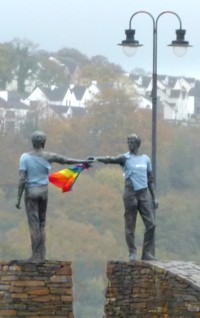The Tudor Conquest
In Tudor times these power struggles got more complex because, following a religious movement in northern Europe, Britain became Protestant. The trigger for this switch in denomination was the new Pope's refusal to grant the Tudor, King Henry VIII of England a divorce. The Pope had little option as he had recently been a prisoner of the Holy Roman Emperor Charles V who was Henry's wife's nephew and the king of Spain. The Pope was out of gaol on 'good behaviour' and equivocated. Henry, having corresponded with Martin Luther, promptly gave his ecclesiastical support to the English Protestants, whom he had previously opposed. A previous Pope had even bestowed on him the title: 'Defender of the (Roman) Faith'.
In this Henry had much local support, as Protestantism was already taking Northern Europe by storm and appealed to parochial English sensibilities. In particular the monasteries still controlled vast areas of land and were seen as a law unto themselves and/or beholden to a foreign power. In addition, they were satirised in that new invention - printed media - as being both materially and sexually corrupt - even back then.
After publication of Luther's 95 theses in 1517, Rome was increasingly viewed as robbing Christendom to the Rome's greater glory, in particular to rebuild St Peters, then the largest building on earth. From 1536 Henry, with popular support, progressively confiscated monastery lands and buildings and sold them to wealthy individuals.
Tudor Ireland - more castles and churches
A few years later, to further consolidate his personal power, Henry decided to take control of Ireland from the Anglo-Norman kings. As he had done in England, Henry arranged to be declared head of the Church in Ireland through an act of the Irish Parliament. He then confiscated Roman Catholic lands and monasteries but this time often simply gave them to the Anglo-Irish Lords to secure their allegiance and loyalty.
Most of the ecclesiastical buildings, like churches and cathedrals, continued under a reformed Protestant liturgy, stripped of 'Romeish' heresy (like sacraments with no support in scripture; a transubstantiated host; and prayers for the dead - there being no such place as Purgatory). As elsewhere in northern Europe, the Protestants asserted that Rome had become corrupt and no longer espoused 'pure' Christianity.
Under the Catholic Queen Mary, Henry's first daughter, attempts were made to restore the monasteries but after two decades it was too late. The new owners were reluctant to surrender the properties; monastic life had been dissipated (in both senses of the word); many of the older clergy had died; and many priests and nuns continued their careers under the new liturgy, like The Vicar of Bray, and had begun to marry.
Mary tried to enforce return to the Roman Church by a program of executions and burnings and soon became known as 'Bloody Mary'. This was put to an end when she died and her younger sister Elizabeth I ascended the throne and reached a religious compromise. This was a less radical Catholic Protestantism, in which the 'pure', unsullied, line of Christianity 'free from the extraneous and heretical glitter of Rome' was said to have come to England with St Augustine of Canterbury, at the end of the 6th century.
If you visit Elizabeth's tomb in Westminster Abbey and read Latin (or have the guide book) you will see that restoration of the 'pure primitive (original) religion' is listed as one of her achievements, along with restoring the economy; routing the Spaniard; and putting down the Irish rebels.
| Translation of the Latin inscription: Sacred to memory: |
But the more extreme Protestants were not satisfied. In addition to forming a more Calvinist 'low church', numerous colourless and abstemious Protestant sects sprang up. When efforts were made by the Church of England to suppress them, several of these took themselves off to the New World, as had the Protestant French Huguenots. Yet many of the common folk, particularly in Scotland and Ireland were not swayed by the dissenters.

